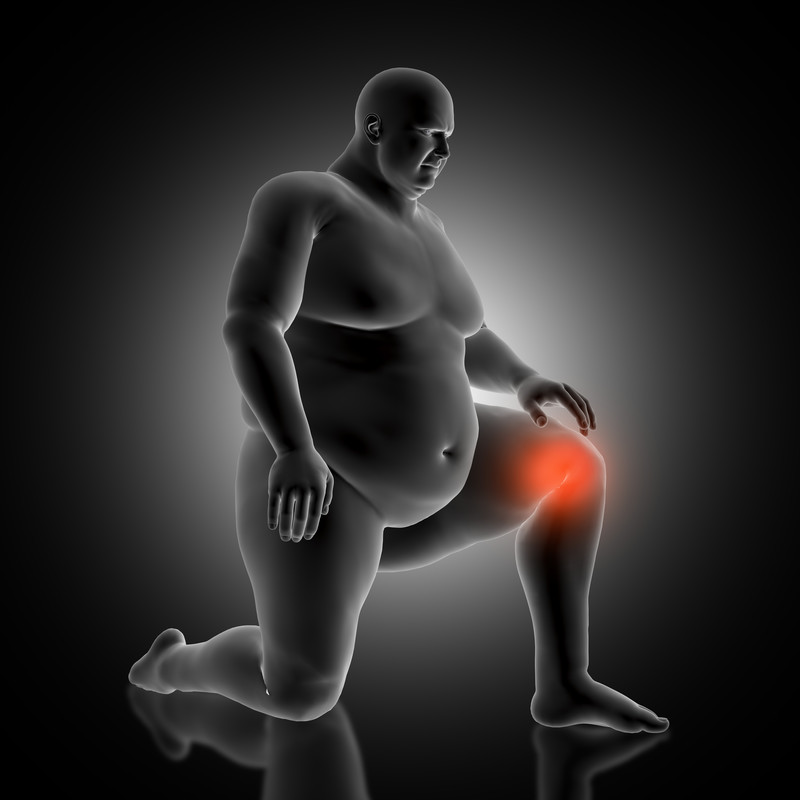Many patients with bad knees blame the inability to exercise and be active for the overweight/obese condition they are suffering from. During interviews with these people doctors will often hear the patient say: “I need to get my knees fixed so I can lose weight,” and/or “If I get my knees fixed I can exercise more and be more active.”
For many patients they think the easiest way to greater activity and weight lose is the knee replacement procedure. As we will see in the research, knee replacement may be helpful to some, not helpful to all in their quest to lose weight and be more active.
This is research from Dr. Daniel Riddle Virginia Commonwealth University in the medical journal Arthritis care and research:
“Patients who undergo knee (replacement) are at increased risk of clinically important weight gain following surgery. Future research should develop weight loss/maintenance interventions particularly for younger patients who have lost a substantial amount of weight prior to surgery as they are most at risk for substantial postsurgical weight gain.”(1)
Highlights:
- Patients are at risk to GAIN weight after knee replacement
- Patients who lost weight before the knee replacement, especially the younger ones, are at a greater risk to gain substantial weight after the knee replacement
People get knee replacement because they think it will help them lose weight – this is not so according to research
Let’s not rely on one study, let’s explore further with researchers in Brazil.Publishing in the Brazilian journal of orthopedics:
Highlights:
- In this study researchers observed no significant reduction in body mass after knee replacement surgery, and 54% of the patients presented weight gain.
- Patients who underwent Total Knee replacement did not obtain a significant reduction of Body Mass Index after the surgical procedure. (2)
How do we explain this? Most patients say that they get knee replacement to reduce pain and increase function. Research says patients after knee replacement likely not to improve activity levels
How can this be? When patients are asked why did they have knee replacement, the answers are:
1) Too much pain
2) Too little function/activity
3) Perception that the patient will be in better health.
So now we come upon this research published in the World journal of orthopedics. Here are the highlights:
- The investigation of physical activity following total knee replacement found several studies that suggest physical activity for patients is at below pre-surgical levels.
- Daily physical activity for patients following total knee replacement may fall short and does not meet recommended daily amounts for health maintenance and/or improvement.(3)
The take home message
Research tells us that there are no easy answers to losing weight and increasing physical activity, and that patients should not be lead to believe that knee replacement is the easy way to achieve these goals.
1 Riddle DL, Singh JA, Harmsen WS, Schleck CD, Lewallen DG. Clinically important body weight gain following knee arthroplasty: A five-year comparative cohort study. Arthritis care & research. 2013;65(5):669-677. doi:10.1002/acr.21880.
2 Schwartsmann CR, Borges AM, Freitas GLS de, Migon EZ, Oliveira GK de, Rodrigues MW. Do patients lose weight after total knee replacement? Revista Brasileira de Ortopedia. 2017;52(2):159-163. doi:10.1016/j.rboe.2017.01.003.
3 Paxton RJ, Melanson EL, Stevens-Lapsley JE, Christiansen CL. Physical activity after total knee arthroplasty: A critical review. World Journal of Orthopedics. 2015;6(8):614-622. doi:10.5312/wjo.v6.i8.614.
